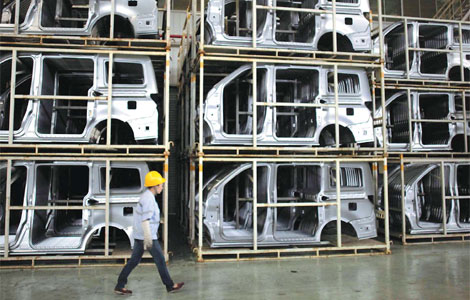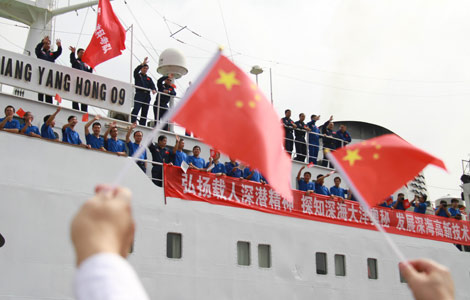Cross-border online trading offers retailers hope
Updated: 2013-06-10 17:28
(Xinhua)
|
|||||||||||
The initial public offering (IPO) of Beijing-based LightInTheBox on Thursday was the first Chinese company IPO in the United States this year. The firm sells clothes, electronics, toys, sports goods as well as gadgets among other products.
As China witnesses a period of slow trade growth, retailers have turned to online platforms to access overseas markets.
According to National Development and Reform Commission (NDRC) data, cross-border online trade volume surged 33 percent year on year to 1.6 trillion yuan ($260 billion) in 2011. It increased 25 percent year on year to 2 trillion yuan in 2012, far exceeding the total trade growth of 6.2 percent.
Clothes merchant Lin Wenxin, in east China's Zhejiang Province, launched an online shopping website two years ago, selling to customers in the U.S., Europe, Brazil and Australia.
As traditional trade, such as shopping in store and having to use foreign buyers, have declined, Lin's business has witnessed profitability at over 20 percent.
He said direct access to customers without dealers has contributed to the business's profits.
At a forum of e-commerce development on cross-border trading held on Saturday in Ningbo City of the province, many companies and entrepreneurs attending the event have created their own online cross-border sales sites.
Alternatively, firms or traders sell products through online retail platforms such as eBay, Amazon and AliExpress, which is operated by China's online retail giant Alibaba.
Liang Minjun, a manager of the international financial department at Ali Small and Micro Financial Service Company, said thousands of sellers on Taobao.com, Alibaba's domestic online retail platform, open cross-border services every day, trying to sell their products abroad.
In the city of Yiwu, the world's largest wholesale center of small commodities and accessories located in Zhejiang Province, nearly 120,000 online sellers had registered on retail platforms by the end of 2012.
The number of online orders reached 150,000 each day in the first quarter, up 50 percent year on year, figures from the city's commercial bureau showed.
Clothes, suitcases, bags, cellphones, shoes and lamps are among the best sellers.
According to the figures released by the General Administration of Customs (GAC) on Saturday, exports last month edged up merely 1 percent year on year to 182.77 billion U.S. dollars, making it the slowest growth in nearly a year.
Government officials believe LightInTheBox's listing in New York illustrated recognition towards China's cross-border e-businesses, but warned that the sector faces difficulties in terms of customs clearance, inspection and quarantine, logistics and payment.
High express costs, duty and security issues have to be considered during the delivery process. Also, currency difference as well as risks for sellers and buyers can exist during the payment process, said Zhang Yan, an official with the Ningbo Port Office.
For smooth operation of cross-border online trade, the NDRC and the GAC at the end of 2012 included the cities of Ningbo, Zhengzhou, Shanghai, Chongqing and Hangzhou as national trial cities for cross-border online trading services.
Port management authorities of these cities are being encouraged to provide services and share information with e-commerce businesses by building an e-port system.
Meanwhile, cross-border online retail platforms are engaged in offsetting any disadvantages.
Related Stories
Online retail sees drop in turnover 2013-05-10 07:27
Online retailer to list stock in New York 2013-04-22 11:23
Online retailers hope to challenge industry trend 2013-04-12 09:50
Online retailing spurs changes in economy, study says 2013-03-26 10:32
Online retailers urged to revamp business 2013-01-11 01:16
Today's Top News
8 students confirmed to have died in bus fire
Ex-CIA man says he exposed US spy scheme
China, US ready to
open a new chapter
Spacecraft to be launched on June 11
Fortune smiles on Chengdu as forum concludes
CPI suggests weaker economy
ROK, DPRK to hold govt meeting
Automakers gear up for an Eastward drive
Hot Topics
Lunar probe , China growth forecasts, Emission rules get tougher, China seen through 'colored lens', International board,
Editor's Picks

|

|

|

|

|

|





